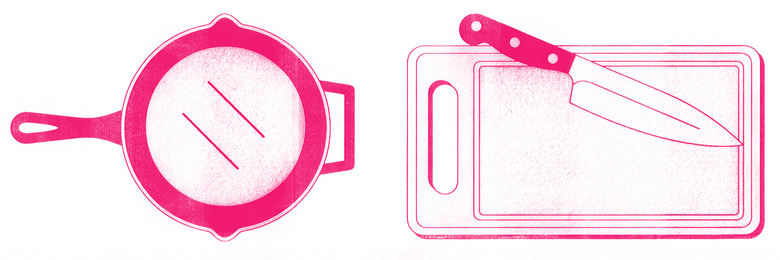How To Cook In Your Dorm Room, First Apartment And Beyond
SAM SIFTON SHARES HIS GO-TO RECIPES AND WHAT YOU SHOULD (AND SHOULDN'T) BUY FOR YOUR FIRST PLACE.
I'm definitely not opening a five-star restaurant any time soon, but after my freshman negative five — yes, I actually lost weight — I realized I couldn't just turn my nose up at food I don't like. For now, I've been getting pretty creative in the dining hall. One day, I'll have to actually figure out how to make food for my tastes and needs.
But how should I start? What kinds of tools and easy recipes will work in a dorm room or my first apartment? To get some answers, I called Sam Sifton, The New York Times food editor.
Amanda Gorman: When did you first learn how to cook?
Sam Sifton: I'm from New York City and I'm a child of the 1970s and 1980s, which means I'm a child of divorce. My mother was a big home cook, and we had great dinners with her and my dad when they were married. When they split up, there was a little more latchkey-ing and cooking for yourself after school. When I got to college, I needed money and I got a job at the Harvest on Brattle Street in Harvard Square.
AG: I know that place!
SS: Yeah! During that time I remember thinking, "Wow, I think I know how to cook now." I didn't then, and still don't, think I could be a chef. But when I became a journalist, I figured out how I could, no matter what job or gig I was doing, keep a hand in writing about food.
AG: So I'm living on campus at Harvard. What tools should I have for cooking?
SS: All you really need is the dorm fridge, maybe an electric kettle, and if you really trick it out, a toaster oven, though some places don't let you have the toaster oven.
AG: I don't even know what I'd make.
SS: You can make ramen really good, as I learned from a guy named Roy Choi, who is a Korean American chef in Los Angeles. He describes the ramen of his youth, which strikes me as what could make perfect dorm food.
You slip an egg into the prepared ramen, and it cooks in the heat. You can put American cheese on there and then it melts. It's essentially oil, which has been whipped into a plastic form. When it melts it becomes this weird, stringy deliciousness. Sesame seeds, or the Japanese condiment furikake can go in there. Add in some cut scallions. You've just cooked. You've made something better than it was.
AG: Wow, O.K. I'm salivating.
SS: If you are able to pull off a toaster oven, the world of open-faced grilled sandwiches is wide open to you. I've cooked a chicken leg in a toaster oven. It's simple! Salt, pepper, some oil, you put it on the tray, not on the rack, run it at 425 degrees until the dorm room smells like your mom's house.
AG: Really? In a toaster oven?
SS: When you're cooking something at 425 degrees in the toaster oven, it truly doesn't matter what it is. You can do it with broccoli or you can do it with cauliflower. You can do it with carrots. You can do it with chicken and carrots. You can do it with it cauliflower, broccoli, chicken and carrots. If everything is roughly the same size, it will cook at approximately the same speed.
The secret that people don't tell you in college when they're still trying to make you believe that cooking is complicated is that there's really only like 11 recipes in the whole world. Right? It's not that complicated. You're either going to broil it, roast it or steam it, or in the case of the ramen, reconstitute it. So with the broiler in the toaster oven, you can do a lot.
AG: What if you've graduated from school, or at least moved from cooking in a dorm to your own apartment? What tools should everyone stock in their kitchen?
SS: These are the basics you'll want in your first place (Wirecutter, a New York Times company that reviews and recommends products, has budget picks for most of these):
Three knives
— Chef's knife. It's the central knife of the kitchen. The blade will be probably eight to nine inches long, and you can use it to cut anything.
— Paring knife. A little knife for trimming things.
— Bread knife. It's serrated, so it grabs the bread and slices it more thinly.
Sauté pan (9 to 11 inches)
A lot of people make a bad mistake and get a nonstick pan because they think, "I don't know how to cook that well, so I'm going to get this nonstick pan and nothing's going to stick to it." Don't do it! The best thing you can do is to get a cast iron pan, which requires some upkeep, or a stainless steel pan. Very little will stick to it.
Pot
To boil water in or make stew. You need something with a heavy bottom so that the heat is even. Make sure it has a lid. If you can convince your parents or someone to get you an enamel cast iron one, that's great. Otherwise you'll probably get one later on when you're married or move in with someone. It's also good to have a colander so you can drain pasta without losing all of it
Cutting board
Dish towels
I like to have a bunch of dish towels around rather than just relying on paper towels, it helps keep things clean. I always put a dish towel under my cutting board so it doesn't slide around.
Big spoon
Spatula
You need a spatula to turn things over, like burgers, fish and steak. I like to use a fish spatula or an offset spatula.
Tongs
Get the most basic, restaurant-style tongs you can find.
A couple of sheet pans
On the sheet pan you can bake cookies, you can cook anything. I bought my sheet pan on Delancey Street when I got out of college, and it was a terrible one, a nonstick one. I had that thing for like 30 years before I threw it out. So it makes sense to get one you like, because you're going to have it for a while.
AG: What are some quick recipes I should master once I'm in my own place?
SS: You should learn to roast a chicken. You can do that in your sauté pan in the oven.
You should also try making pasta and tomato sauce. For this, you're going to need a big pot and a sauce pan or smaller pot. Marcella Hazan has one of the most incredible recipes for plain tomato sauce known to man, and it's really simple. You take high-quality canned tomatoes, put them in the pan with one-half of a peeled onion and a stick of butter, and you just let that bubble, bubble, toil and trouble, for like half an hour at really low temperature. You hit it with some salt and pepper and that thing tastes like ... velvet probably doesn't taste very good, but it feels like velvet and tastes like deliciousness. Then you make the pasta, and you dress the pasta with the sauce. That with some bread and a glass of wine because you're 21 in your own apartment. A candle. Oh my goodness.
AG: What's your best advice for cheap cooking?
SS: Rice and beans. Every time. You can make the beans taste 18 different ways, you can do a lot of different stuff with the rice. If you're not vegetarian you can add stuff to the rice that's made of pork products, and if you are vegetarian you can add stuff that's made of spice and herbs. It's high protein, super delicious and cheap, cheap, cheap.
This interview has been edited and condensed.
LET'S FIGURE IT OUT
Laura Masgula, a recent graduate from N.Y.U., sent us a problem to figure out this week:
I'd love to hear how people just out of college are balancing work, friends, family, exercise, extracurriculars, etc. while still attempting to eat well, sleep and budget. It's been a challenge trying to manage everything personally so getting some advice or just being able to hear from others would be valuable.
Several contributors to The Edit are recent graduates. Here's what they had to say.
Nushrat Rahman:
Having been out of school for over five months and I'm now realizing how all-consuming school was for me. I juggled community organizing, internships, friendships and family commitments along the way. All of this took a toll on my physical health — my acne was out of control — and my mental health spiraled to the point where I was in a perpetual bubble of anxiety. People around me noticed. My spirituality took a hit as well.
Now, I'm careful not to fall into the habits from a few months ago. Some good advice I got from a mentor once was to undercommit and over-deliver. I'm trying to live by that mantra daily. I try my hardest to nail down the basics in my day, like food, sleep and five daily prayers. I then prioritize everything else around those three elements, whether it's work, freelancing or community organizing.
Robbie Harms:
The biggest thing I've learned since I graduated in 2015 is to carve out some daily, uninterrupted me time. For me, that takes the form of running. Every day, no matter how much stuff I have to do and how much time I don't have to do it, I try to run — around seven miles a day. Sometimes it's gloriously mind-clearing, and other times it's not very fun at all. But without fail, I'm always glad I did it.
Maybe you like to draw, or read or watch TV, or just simply sit and talk. I've learned that the most important thing with whatever you choose, though, is to do it as consistently as possible — every day if you can. That way it becomes as ingrained in your daily routine as brushing your teeth. One more thing: I deleted my Facebook account on Jan. 1, and I haven't missed it yet.
Karina Balan Julio:
I've accepted that in some weeks I'll be more effective in some areas than in others, and that no matter how much I plan my days, some things will take more time than I originally expected. For instance: There are weeks where I have to work a little bit longer to get everything under control at my job, so I end up exercising less and postponing other activities I planned for myself. In others, I'm super healthy and everything is fine with my extracurricular studies and at work, but my apartment's a bit messy, and I may have some unexpected expenses. Sleep, though, is not negotiable for me. I feel like I need to sleep at least six hours a day, otherwise everything else won't work.
Ian Caveny:
I've been out of undergrad (though not out of school) since 2013, married since 2014, and a parent since 2016, and I am beginning to understand that one of the truths of this stage of life is learning how to "surf." Having a balanced life does not look like trying to make my life still, it's about learning the skills necessary to stay on the surfboard when there's a big wave.
Some of those skills are structural, like planning a weekly or monthly budget, or using task-managing apps (like Wunderlist) to keep track of things. Some of those skills are internal, and you have to learn them by failing time and time again.
Omar Pablo:
I find that I am a lot more productive when I set small goals on a daily basis and ask myself, "What do you have to get done by today?" If you break down tasks it will be easier to get them done, and you'll have that sense of accomplishment even if the whole goal hasn't been achieved.
I stressed things that you have to do because I think it is just as important to keep your wants in mind. For example, even though I love to read, I always felt bad because I felt like I wasn't reading enough. As much as I love reading, sometimes I'd rather have dinner with a friend, watch bad TV or feel the suspense of going on a date. In order to really balance your life, you need to realize that you are not supposed to be living your life in any way. Your life is not Instagram feed or a timeline. You don't have to prove anything to anyone but yourself.
Ebony Miranda:
Don't feel like you have to fill up all of your time! It can be hard to adjust to the slower pace of things post-college, but the beauty of not being in school is that everything you do is usually on your own time. Make sure you're taking time for yourself as well.
For tracking expenses, I used to write every purchase in my planner but eventually switched to the Mint budgeting app, which has been quite useful since you can make monthly budgets for pretty much any type of expense. If you want to budget on food I suggest meal prepping for the week as much as you can so you're not tempted to eat out.
© 2018 THE NEW YORK TIMES.



